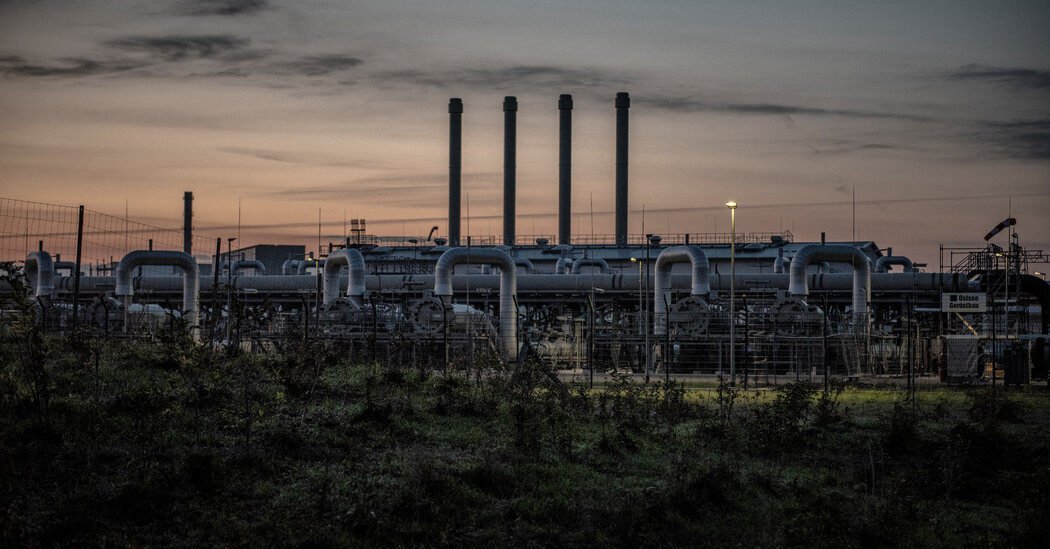The European Union’s executive arm unveiled its latest package of sanctions against Russia, aiming to apply pressure to President Vladimir V. Putin by damaging the nation’s energy and banking sectors.
The sanctions proposed on Tuesday — which still need to be debated and passed by member states — would ban transactions with the Nord Stream pipelines, hoping to choke off future flows of energy from Russia into Europe.
They would lower the price cap at which Russian gas can be purchased on global markets, hoping to chip away at Russian revenues.
And they would hit both Russian banks and the so-called “shadow fleet,” old tanker ships, often registered to other countries or not registered at all, that Moscow uses to covertly transport and sell its oil around the world to skirt energy sanctions. The new measures would blacklist a new batch of ships that are being used in this way.
The proposal is the 18th sanctions package to come out of Brussels since Russia’s full-scale invasion of Ukraine. Taken as a whole, the measures are a sweeping effort to threaten Russian economic might and morale at a critical juncture in the war.
The announcement comes as peace talks between Russia and Ukraine stall. Despite pressure from the Trump administration to work toward a cease-fire, the latest round of talks between the two sides, earlier this month in Istanbul, created little result outside of another agreement to swap prisoners.
“We want peace for Ukraine,” Ursula von der Leyen, the president of the European Commission, the bloc’s executive arm, said during a news conference in Brussels on Tuesday. “Therefore we are ramping up pressure on Russia, because strength is the only language that Russia will understand.”
Ms. von der Leyen said the war must end with a “real cease-fire” and a “serious proposal” from Russia.
The new measures would drop the price cap on Russian oil to $45 from $60 per barrel. Oil prices have declined since the cap was first adopted in 2023, so the point would be to restore how much the limit squeezes Russian revenues.
Because the oil price cap is a Group of 7 measure, the suggestion of dropping the cap will be discussed at next week’s G7 meeting in Canada, Ms. von der Leyen said.
Ms. von der Leyen suggested on Tuesday that she was hopeful the G7 would support such a measure, and that the United States and European Union are “very much aligned” in wanting to bring Russia to the negotiating table.”
Senator Lindsey Graham, Republican of South Carolina, has been pushing for more action against Russia and working on an expansive sanctions package — though it is not clear yet whether President Trump will support it.
Questions often surface about whether sanctions are working. Russia’s economy contracted sharply in 2022, but then rebounded. One reason is heavy military spending. Another is that Russia has turned to new markets, including China.
But European officials insist that the policies are working — and that intensifying them will intensify the effect.
“Every sanction weakens Russia’s ability to fight,” Kaja Kallas, the E.U.’s top diplomat, said on Tuesday. She said recent efforts to tackle Russia’s shadow fleet, in particular, are beginning to pay off.
The European Union has already sanctioned more than 300 ships that were being used to circumvent sanctions. The fresh package of sanctions would list an additional 77 vessels that are part of the Russian shadow fleet, Ms. von der Leyen said.
That’s because officials have been scrambling to keep up with the expanding fleet.
“To some extent, it’s a mouse and a cat chase,” said Ignacy Niemczycki, deputy E.U. affairs minister for Poland, speaking in an interview on Tuesday during a press tour on the Baltic Sea, where the shadow fleet is especially active. “We’re adding more vessels to the list, and they are adding more vessels.”
